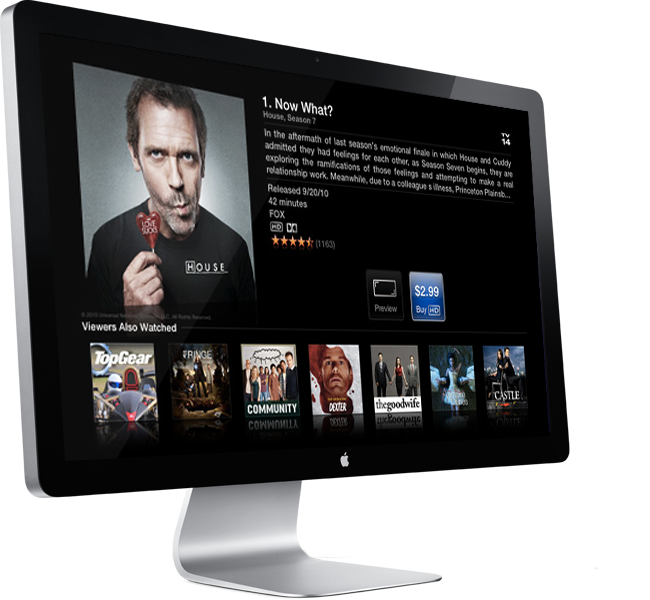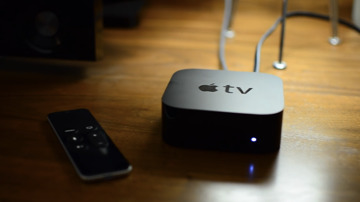Executives at Apple knew as far back as 2007 that the company planned to eventually build its own television set, sources told Nick Bilton at The New York Times. Jobs had reportedly been pushing engineers at Apple for years to develop a new interface for living room TVs.
Apple's internal goal is said to have been simplifying the way users interact with a TV, and to replace the "awkward and confusing remote control." While early concepts included using a wireless keyboard, iPhone or iPad as a remote, the best solution said to have been discovered was voice commands through Siri.
Jobs hinted at the new user interface in his authorized biography released this week. In it, Jobs told author Walter Isaacson that he had "finally cracked" the secret to building an easy-to-use television set, and said it would have "the simplest user interface you could imagine."
Bilton first heard of a possible Apple television set over a year ago, but sources at the company reportedly told him that nothing was being actively built at the time. However, one source said that a full-fledged Apple TV set was a "guaranteed product," as Jobs apparently felt the TV hardware business "is totally broken."
The article states that Apple has "quite a bit of work" left to do on the project, as the company does not have as much expertise in building thin television sets as it does iPhones, iPods and MacBooks.
"The company also needs to wait until the cost of large displays falls," it reads. "Although some 42-inch LCD televisions from mainstream consumer electronics companies can cost as little as $500, the Apple television would include computer electronics and other technology that may make the price uncompetitive."
He sees Apple announcing a product by late 2012, with a potential final release to consumers by 2013. The piece concludes by asserting that a television set is definitely "coming."
Talk of an Apple television set has picked up considerably since the release of Jobs's biography. On Tuesday, analyst Shaw Wu with Sterne Agee said that while Jobs was "very excited" about the prospect of a true Apple TV, the project remains held up by content licensing deals that the company feels are necessary to release a competitive product.
In 2009, Apple was said to have pitched a $30-per-month iTunes subscription plan to content providers, but the company was unable to ink any deals with content providers. The company instead decided to rent individual TV show episodes for 99 cents, but that model was abandoned after it failed to catch on with consumers and content providers were reluctant to jump on board.
On Monday, Bloomberg reported that Jeff Robin, an Apple vice president who helped to build both iTunes and the iPod, is spearheading the company's efforts to produce a connected TV. Such a device is expected to have integrated search functionality that will allow users to seamlessly find their content from a number of locations, including iTunes, Netflix or a cable subscription.
 Slash Lane
Slash Lane




-xl-m.jpg)


-m.jpg)






 Amber Neely
Amber Neely
 William Gallagher
William Gallagher
 Malcolm Owen
Malcolm Owen

 Mike Wuerthele
Mike Wuerthele


 Thomas Sibilly
Thomas Sibilly








133 Comments
Apple has reportedly been at work on a full-fledged high-definition television set for years
Well ya don'y say
I NEED an Apple TV!
Apple has reportedly been at work on a full-fledged high-definition television set for years, but the company's recent launch of Siri for the iPhone 4S is believed to be one of the final puzzle pieces necessary for Apple to launch its own TV.
On Monday, Bloomberg reported that Jeff Robin, an Apple vice president who helped to build both iTunes and the iPod, is spearheading the company's efforts to produce a connected TV. Such a device is expected to have integrated search functionality that will allow users to seamlessly find their content from a number of locations, including iTunes, Netflix or a cable subscription.
[ View this article at AppleInsider.com ]
Apple has never been any good at search.
I predict that this will be a regular TV with Siri functionality built-in via a search app. And it will have the ability to buy stuff from Apple.
I hope that it will be more.
I've tried talking to my Xbox with Kinect, and it's inability to recognise pretty much anything makes it 100% useless. I've also played around with Siri on my wife's iPhone 4S and the results are.... to be frank, garbage.
Perhaps it's because we're English and not American, but it's accuracy was only around 50%. it produced amusing results, but it's really limited to toy value for now. The thought of trying to control a TV solely using voice commands is not in the least bit appealing. I think I'll stick with my TiVo.
I've tried talking to my Xbox with Kinect, and it's inability to recognise pretty much anything makes it 100% useless. I've also played around with Siri on my wife's iPhone 4S and the results are.... to be frank, garbage.
Perhaps it's because we're English and not American, but it's accuracy was only around 50%. it produced amusing results, but it's really limited to toy value for now. The thought of trying to control a TV solely using voice commands is not in the least bit appealing. I think I'll stick with my TiVo.
This is the big reason Apple stayed with Nuance for siri instead of trying to roll their own or go with someone else, IMO. Understanding what you are saying is critical and no one does it better than Nuance. The other side, understanding what you mean, is perhaps something Apple added to the process. I could imagine a similar collaboration for a TV/Home Entertainment product.